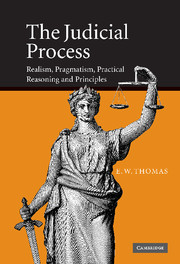Book contents
- Frontmatter
- Contents
- Preface
- 1 Introduction
- 2 Muddling along
- 3 The ‘curse’ of formalism
- 4 Legal fundamentalism
- 5 The idolatry of certainty
- 6 The piety of precedent
- 7 The foibles of precedent – a case study
- 8 There is no impersonal law
- 9 So, what is the law?
- 10 The constraints on the judiciary
- 11 Towards a new judicial methodology
- 12 Of realism and pragmatism
- 13 Of … practical reasoning and principles
- 14 Taking law seriously
- 15 A theory of ameliorative justice
- Subject index
- Authors index
Preface
Published online by Cambridge University Press: 15 July 2009
- Frontmatter
- Contents
- Preface
- 1 Introduction
- 2 Muddling along
- 3 The ‘curse’ of formalism
- 4 Legal fundamentalism
- 5 The idolatry of certainty
- 6 The piety of precedent
- 7 The foibles of precedent – a case study
- 8 There is no impersonal law
- 9 So, what is the law?
- 10 The constraints on the judiciary
- 11 Towards a new judicial methodology
- 12 Of realism and pragmatism
- 13 Of … practical reasoning and principles
- 14 Taking law seriously
- 15 A theory of ameliorative justice
- Subject index
- Authors index
Summary
Alexander M. Bickel said:
Judges have, or should have, the leisure, the training, and the insulation to follow the ways of the scholar in pursuing the ends of government. This is crucial in sorting out the enduring values of a society …
Although unaware of this aphorism at the time, it is nevertheless an exhortation I sought to follow as a judge. Regrettably, the training of a judge is essentially practical, the insulation is imperfect and the leisure is effectively non-existent. As an overworked judge at first instance for five years and a frantically overworked judge of an appellate court for just over six years, my aspirations at scholarship fell short of the ‘ways of the scholar’. But in that estate I am in splendid company.
In 1992, after I had been a Judge at first instance for two years, I presumed to write a Monograph with the long title: A Return to Principle in Judicial Reasoning and an Acclamation of Judicial Autonomy. But the work did not emanate from my two short years on the Bench. It reflected the thinking of a practitioner, only lately a Judge, who had spent some thirty-four years in the practice of the law in and around the courts. An irresistible propensity to observe and analyse the legal process in which I was a participant, and an equally irresistible bent to perceive the reality of that process, dictated the conclusions that I expressed in that Monograph.
- Type
- Chapter
- Information
- The Judicial ProcessRealism, Pragmatism, Practical Reasoning and Principles, pp. xv - xxviPublisher: Cambridge University PressPrint publication year: 2005

